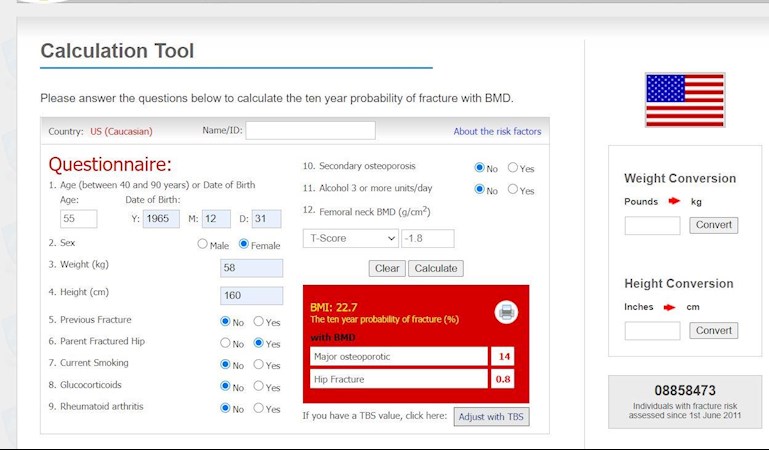Have I completed this correctly?
How do they arrive at your T scores? Is that figure given by the DEXA x ray or nurse interpreting the scan? When the GP asks about history, is that to get your % of a fracture?

Have I completed this correctly?
How do they arrive at your T scores? Is that figure given by the DEXA x ray or nurse interpreting the scan? When the GP asks about history, is that to get your % of a fracture?
Yes, your t-scores are calculated from your DEXA scan. They basically measure the difference between your bone density and that of an average 30 year old (when bone density should be optimal). Your history is to give the risk factors for fracture. So, for example, a family history of osteoporosis raises your own fracture risk.
If you've entered your hip t-score correctly (-1.8) you don't have osteoporosis, but osteopenia. The hip measurement is meant to be a more reliable indicator of fracture risk, but it seems that doctors also calculate spinal fracture risk using the spine t-score, so if yours is different, you may want to do a separate calculation for that too. Based on the information you've provided above, you have a very low fracture risk and are in a very good position to maintain that or maybe even improve your scores.
Are you in the US? That's the country you've put in, though I don't think it's likely to make any significant difference to the results. For t-score calculation, they compare you with the average bone density of a 30 year old in the country you're in. This may not be totally accurate for you as an individual. For example, if you're of Spanish origin but living in the UK, as for some reason the Spanish have poorer bone density than northern Europeans, even though the Spanish are actually less likely to fracture (which is very clear evidence that bone density and bone strength aren't necessarily the same!).
UK. Spine is -3.1. When I complete the form is states to put femoral figure
I spoke to GP tonight for% risk. Fracture of hip 0.8% and other 11%. I would say these aren't too bad??
I don't think they're bad either, although I gather if your fracture risk is over 10% it's considered high by doctors! Look at it the other way, if you have an 11% fracture risk, that means an 89% chance you won't fracture! There's another risk calculator, which is supposed to be more accurate, and is also authorised for use in the UK, although I've yet to come across any professional that uses it. It's called QFracture: qfracture.org/. It bases fracture risk on things like previous fractures, family history etc, and doesn't take into account t-scores.
I watched a brilliant YouTube seminar this morning (pharmac seminars) and he said that %wise it's 3% hip & 15% spine before intervention as long as no falls & fractures
Exactly. They've shown that the risk estimate for a population is fairly accurate - so if there's a 10% risk, 10 people in 100 will fracture. But they can't say which 10 people, and statistically you're more likely to be amongst the 90 who won't fracture!
I agree with Hidden re FRAX scores and have the same opinion of DEXA’s. I take mine (had 2) as a guide as I have no idea what my bones were like before my first and have to trust I was placed in exactly the same position for the second which was done on the same machine.
Re FRAX below copied from a post on Inspire.com (American osteoporosis forum).
“FRAX risk will increase as you get older even if bone density remains unchanged up until about age 85 (this is country dependent). After a certain age your 10 year fracture risk begins to go down because the odds of dying before having a fracture increases.”